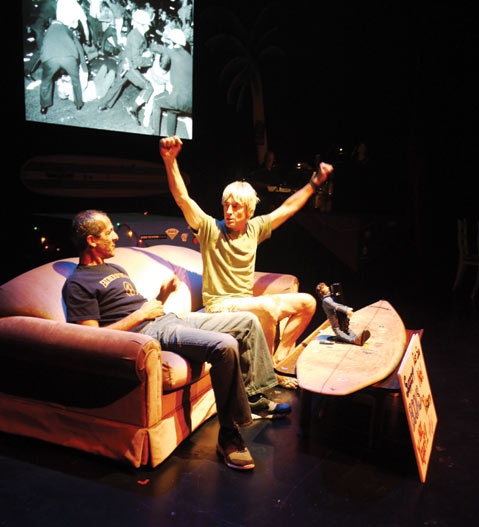Bad Daddy at Center Stage Theater
Original Musical an “Absurdist Tragedy”
The writer, director, and lead actor of Bad Daddy, Rick Cipes, calls his original musical an “Absurdist Tragedy in the 21st Century.” From the surly security guards who meet you at the theater door to the decorative surfboards, DJ booth, scantily clad go-go dancers, and light-festooned port-a-potty that greet you upon entrance, you’ll recognize this as a strictly contemporary Southern California setting.

The crux of this drama is the conflict between a father and his daughter: She’s tethered to her cell phone; he’s desperate for her to get some respect, unplug, and connect with him in real time. Anyone who hasn’t been cryogenically frozen for the past couple of decades will relate to this particular tension around communication technology. Yet underlying this utterly modern theme is the timeless issue of our delicate human connections—a theme that’s as old as theater itself.
It’s no coincidence that the first lines in the musical are lifted from Russian theater of the 19th century: Chekhov’s The Seagull. Tanya (Tara Haggiag) is an updated Nina—a troubled young woman who dreams of becoming an actress but settles for pornographic modeling on the Internet. Her best buddy, Julie (Camille Andersen), can’t make it five minutes without answering her cell phone, typically with a fusillade of slang and cuss words. It’s Julie’s father, Richard (Cipes), who seems to stand for more meaningful relationships. “There’s more to life than being ‘connected,’” he sings, “while all the rest of us are feeling rejected.” Yet Richard’s lonely, too, and his quest for intimacy leads him down less-than-ideal paths: from smoking pot with his stoner buddy to sleeping with the wrong women.
Staging an original musical is about as ambitious as it gets, and this cast of eight pulls off an impressively smooth show, including 14 musical numbers. Andersen’s vocal talents carry many of the songs, including “Growin’ Up Ain’t Easy,” while Cipes croons this catchy chorus: “I don’t wanna end up a robot; I don’t wanna chip in my brain; I just want someone to hold me and tell me it’ll all be okay.”
This show is appropriate for the 18-and-over crowd; it’s full of explicit language and references to sex and drugs. Despite some wooden moments, these actors have more than enough dynamism to carry the plot along. And though the show caricatures 21st-century SoCal culture as almost unbearably shallow, Cipes strikes a chord with his portrayal of tenuous family bonds. There’s compassion in the humor and realism in the conflict, which is what makes Tanya’s fate truly tragic.



